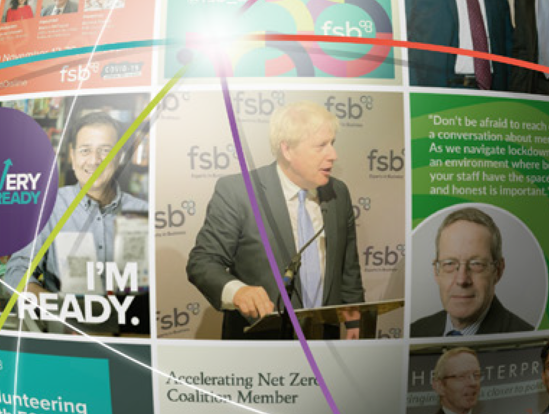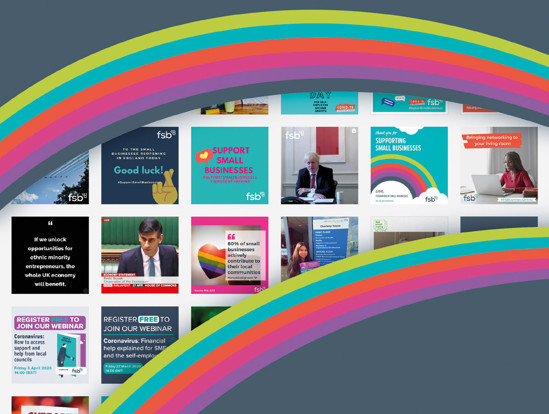Message from the National Chair and Vice Chairs
As we entered this financial year, many of FSB members’ own finances were being stretched to the limit, amid the cost-of-doing-business crisis. Small firms were facing a toxic and growing combination of soaring energy bills, rising inflation, monthly interest rate rises, and the prospect of the highest tax burden in 70 years.
Having given a powerful and effective voice to small businesses, the self-employed and limited company directors during the challenges of the pandemic, and then in mid-2022 as the new cost crisis began to kick in, it was crucial for us to continue to advocate successfully on these 5.5 million’s behalf.
FSB advocacy and campaigning is wired into the organisation’s DNA, as the reason FSB was originally founded in 1974. As cost pressures were becoming more acute – threatening the survival of many small firms – it couldn’t have been more relevant in 2022-23.
Through extensive strategic political engagement, media and public relations – rooted in our policy research and recommendations – we proposed and secured a number of big-ticket measures to offset at least some of these cost pressures, while warning that a failure to address the increasingly acute situation heading into winter would lead to the loss of more small firms on top of the 500,000 shrinkage in the small business community over the main two years of the pandemic.
In October, the Energy Bill Relief Scheme, worth up to £12bn, to help small firms through the winter of 2022-23 against the headwinds of sky-high energy costs, came into effect, having been significantly influenced in its creation by FSB. As this scheme neared its conclusion in spring 2023, we campaigned for energy companies to allow those still trapped on contracts taken out at the price peak to ‘blend and extend’ those contracts onto a lower tariff to match the spring reduction in energy wholesale prices. This was adopted by a number of energy companies and endorsed by Ofgem.
When it came to tax, FSB highlighted to Government the threat to many small firms of potential rises in Business Rates, or short-term reliefs coming to an end just as cost pressures were really beginning to bite. In the first Autumn Statement of Chancellor Jeremy Hunt, FSB successfully secured an extension of the 75 per cent relief for small businesses in retail, hospitality and leisure in England – a sector our quarterly Small Business Index survey demonstrated was feeling the squeeze especially badly. The Chancellor also confirmed there would be no annual inflation-linked increase in Business Rates, for all our members not already covered by Small Business Rates Relief.
Despite the changes in leadership at the top of the UK Government, FSB also successfully campaigned to protect a planned reversal of a 1.25 per cent increase in National Insurance Contributions (NICs) for employers, employees and the self-employed, and was vocal on behalf of directors of limited companies who had been taken out of an equivalent reversal.
An employer NICs discount for those taking on military service leavers – originally secured by FSB in partnership with X-Forces Enterprise – was also successfully maintained. Meanwhile, another original FSB win – the employment allowance – was protected at its heightened level of £5,000.
Significant progress was made in our extensive campaigning to tackle the issue of late payments. Following pressure from FSB, an official consultation was launched in December 2022, which we submitted into and extensively campaigned around when it was published in spring 2023. This was bolstered by new FSB research showing a 25 per cent increase in late payments, and the issue affecting more than half of small businesses.
This research formed the basis of the findings and recommendations of our policy report, Time is Money, which was also a platform for impactful media engagement on the issue. A major win came in September 2023, when a pledge to take action on late payments was the headline message in a speech by the Business and Trade Secretary, Kemi Badenoch, at the opening of FSB’s new Westminster office, and paved the way to the Chancellor subsequently dedicating a section of his 2023 Autumn Statement to the issue.
Internationally, FSB published new research and recommendations based on the experiences of small business exporters and importers, following changes brought about by the UK’s exit from the EU, as well as other contemporary global challenges and opportunities. Engagement continued at both a UK and international level. Progress made included the Government’s export credit agency, UK Export Finance, announcing new products to help small businesses access trade finance, following calls from FSB to make its products more suitable for small firms. Meanwhile, the Government dropped the ‘sunset clause’ in the Retained EU Law Bill, which would have automatically revoked retained EU law at the end of 2023, creating business uncertainty. FSB also undertook an impactful trade mission to Washington D.C., building links with the US administration on furthering UK small business trade with the United States.
Back home, while significant cost pressures remained, that did not deter many small firms from wishing to play their part in the road to net zero, with the right support to help them to do so. FSB secured a ‘Help to Green’ pilot for funding for small businesses investing in environmentally beneficial improvements. Meanwhile, small firms benefited from business rates exemptions for green enhancements to their premises, such as solar panels, which FSB had previously secured.
Throughout the year, FSB’s volunteers remained pivotal to our work. Our policy volunteers at UK, devolved nations and regional level informed our policy positions and remained highly engaged in supporting our advocacy for them. Our regional chairs and area leads also supported this, alongside being ambassadors for FSB in their part of the UK.
Download the full report below




